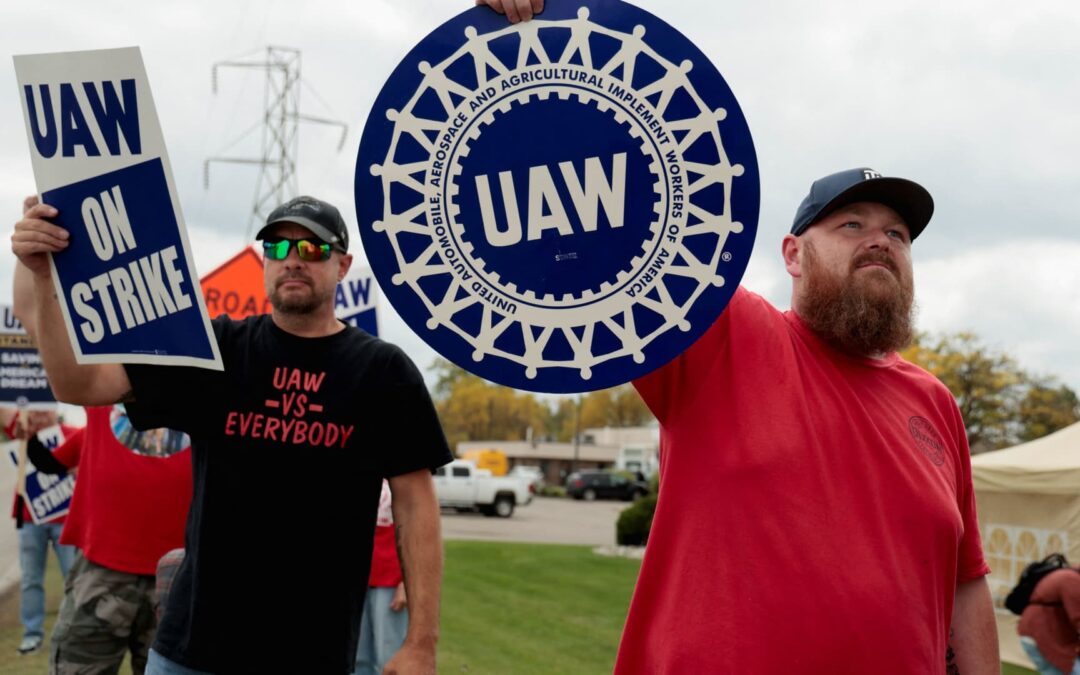Striking United Auto Workers members from the General Motors Lansing Delta Plant picket in Delta Township, Michigan, on Sept. 29, 2023.
Rebecca Cook | Reuters
DETROIT – Republican governors of six states on Tuesday condemned the United Auto Workers’ push to organize automotive factories in the South, warning the union’s efforts could lead to layoffs and fewer future investments.
The joint statement – signed by governors in Alabama, Georgia, Mississippi, South Carolina, Tennessee and Texas – comes a day before Volkswagen workers in Chattanooga, Tennessee, begin voting on whether to join the UAW.
The VW vote is part of an unprecedented labor organizing drive announced last year by UAW President Shawn that targets 13 automakers operating in southern states and elsewhere. Last year the union negotiated record contracts with General Motors, Ford Motor and Chrysler parent Stellantis.
The elected state leaders, including Tennessee Gov. Bill Lee, argue such contracts provide short-term assistance but have long-term negative implications on jobs and investments.
“We have worked tirelessly on behalf of our constituents to bring good-paying jobs to our states. These jobs have become part of the fabric of the automotive manufacturing industry. Unionization would certainly put our states’ jobs in jeopardy – in fact, in this year already, all of the UAW automakers have announced layoffs,” read the statement.
Bill Lee, governor of Tennessee, smiles during the Conservative Political Action Conference (CPAC) in Dallas, Texas, U.S., on Saturday, July 10, 2021.
Dylan Hollingsworth | Bloomberg | Getty Images
The UAW, which also is in the process of an organizing vote of Mercedes-Benz workers in Alabama, did not immediately respond for comment.
Since the ratified UAW contracts with the Detroit automakers, there have been buyout offers as well as layoffs of salaried and hourly workers at the companies, but increased labor costs are not the sole reason.
Automakers have been cutting costs in part to invest billions in all-electric vehicles as well as prepare for slowing market conditions and fears of an economic downturn.
Stellantis – a product of a January 2021 merger between Fiat Chrysler and PSA Groupe – has led the cuts, but many have been of supplemental, or temporary, workers that do not have the same pay or benefits as traditional assembly plant workers under the deals.
The transatlantic automaker has reportedly cut more than 1,000 supplemental workers this year, citing a review of its manufacturing operations “to ensure all facilities are operating as efficiently as possible in very challenging market conditions with all actions in accordance with the 2023 Collective Bargaining Agreement” with the UAW. It’s also cut shifts at least two Jeep plants, citing the complexity of the agreements among other reasons.
United Auto Workers President Shawn Fain testifies about the toll of working hours on laborers before the Senate Senate Health, Education, Labor, and Pensions Committee in the Dirksen Senate Office Building on Capitol Hill on March 14, 2024 in Washington, DC.
Chip Somodevilla | Getty Images
Ford has offered voluntary buyouts to its workers and announced layoffs, but many of its workers who had been laid off were transferred to other nearby facilities.
GM also is offering voluntary buyouts, though its post-contract layoffs have largely, if not completely, dealt with factory changes. For example, the company laid off 1,300 workers in Michigan due to the end of vehicle production at two plants.
Aside from Tennessee’s Lee, other Republican governors to sign the statement were: Alabama Gov. Kay Ivey, Georgia Gov. Brian Kemp, Missouri Gov. Tate Reeves, South Carolina Gov. Henry McMaster, and Texas Gov. Greg Abbott.









